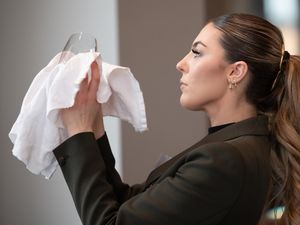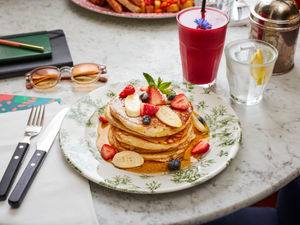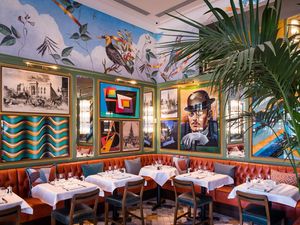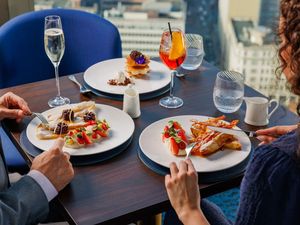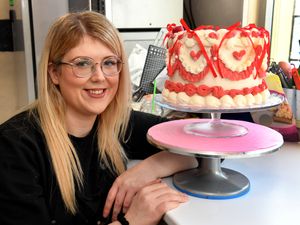So much more to the man than just the myth: We talk to award-winning restaurateur Marco Pierre White
Humane. Warm. Empathetic. They’re words infrequently associated with gastronomy’s enfant terrible, Marco Pierre White.
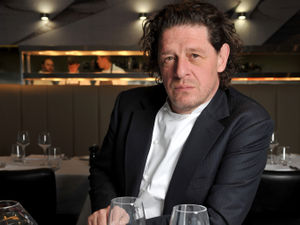
And yet those are precisely the qualities that he displays across a two-hour meeting at his home.
Don’t imagine for a moment, however, that such virtues should be confused with being soft or easily won over. Marco doesn’t suffer fools gladly and a reputation for ruthlessness, impatience and the pursuit of brilliance at all costs exists for a reason.
Yet there are different qualities that the public doesn’t frequently see. The Marco who devotes time and money to an extraordinary hotel-farm near Bath is also tender and kind, generous and thoughtful. There is more to the man than the myth.
He doesn’t have anything to plug today. There’s no new restaurant nor product to endorse. He’s not here to peddle products for a corporation nor to settle scores against old foes. Instead, he’s providing a rare window into the extraordinary world he created after leaving his native Leeds in 1981 with £7.36, a box of books and a bag of clothes.
His story remains the most remarkable of all.
He continued his training under Pierre Koffman at La Tante Claire, moving to work in the kitchen of Raymond Blanc at Le Manoir, and later with Nico Ladenis of Chez Nico at Ninety Park Lane. He then branched out on his own, working in the kitchen at the Six Bells public house in the Kings Road with assistant Mario Batali. In 1987, White opened Harvey’s in Wandsworth Common, London, where he won his first Michelin star almost immediately, and his second a year later. He won the Newcomer Award at the 1987 The Catey Awards, run by The Caterer magazine.
He later became chef-patron of The Restaurant Marco Pierre White in the dining room at the former Hyde Park Hotel, where he won the third Michelin star, and then moved to the Oak Room at the Le Méridien Piccadilly Hotel. In 1994, at the age of 32, White became the first British chef to be awarded three Michelin stars and also the youngest in then Michelin history.
Although White worked for seventeen years to pursue his ambition, he ultimately found that, in spite of his accomplishments, recognition and fame, his career did not provide him with adequate returns in his personal life. So, in 1999 he retired and returned his Michelin stars.
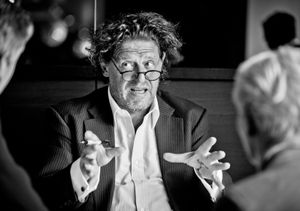
And for the past 20 years, he has done whatever the hell he’s liked. He is lionised by chefs and adored by the general public. He is the only living British chef to whom the term ‘legend’ can accurately be applied. In his, unique case, it can be used without hyperbole and disingenuousness.
White opened the doors for others. His example remains a touchstone for legions of chefs who might wish to follow the steps in which he trod. Not that Marco cares about any of that. He’s too busy planting beautiful acer plamatum trees at his hotel-farm. The man who was asked to explain his genius to the nation’s brightest young minds at the Oxford Union has other things to consider.
“The truth is, I don’t think about it. I really don’t. Sometimes, I’m a little surprised by the warmth that the industry shows me. But I do never think about it. That’s part of my life which has gone. Those little Michelin stars were just stepping stones to where I am today.”
Therein lies the most remarkable truth of all. Marco was the most remarkable chef of all. He was a gastronomic Muhammad Ali, a culinary Pele. He redefined British cuisine just as Usain Bolt redrew the rules for the 100m. But he refuses to be defined by achievements that have been unsurpassed. Frankly, he doesn’t give a damn.
“Like food or gardens or people, you have to evolve. You can’t keep on playing the same drum. Winning three stars was very exciting but retaining them was very boring, that’s why a lot of those three-star chefs aren’t in their kitchens any more. No disrespect to them because I understand why. But I just had to let the world know that I was retiring, handing up my apron. I didn’t want to live a lie and pretend I was cooking when I wasn’t.”
Marco was the third of four boys born to English chef Frank White and Maria-Rosa Gallina, an Italian emigrant from Veneto. He caught rabbits as a kid to supplement the family table and a love of food was ever present. White left Allerton High School in Leeds without any qualifications and decided to train as a chef, initially at Hotel St. George in Harrogate and then at The Box Tree in Ilkley. He was driven not by ambition nor a desire to impress but by an emotion far more visceral: the fear of failure.
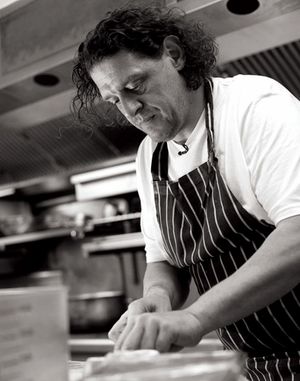
“It’s simple. I was ruled by my fears of failure. I was fuelled by my insecurities. It’s that simple. I think true success is really self-discovery. What was gastronomy to me? Gastronomy was therapy. It allowed me to unravel myself and start to discover myself.
“If I do something, I do it for the right reason not the wrong reason. If I give something I give it for the right reason and not the wrong reason. I accept things for the right reason and not the wrong reason.”
Marco was responsible for a gastronomic revolution. A number of chefs who worked for him went on to considerable success. In the same way that the Roux brothers, Michel and Albert, inspired a wave of brilliant new chefs, so Marco was responsible for launching the careers of a huge number of cooks. His legacy is extraordinary.
“The successes that all those individuals have were created by themselves. I played no part in it. If anything, they assisted me in realising my dream. I didn’t win three stars, it was the young men and the young women behind me who won those three stars.
“I was the composer, I was the conductor, they were the orchestra; it’s as simple as that. In assisting me in winning my dreams, they could see what was possible. So I assisted them in realising their dreams if they wished to commit themselves to that extreme. I think that’s what life’s all about; acknowledgement, in my case, that if it wasn’t for my peers at The Box Tree and other great chefs I worked with, I wouldn’t have realised my dream.”
He still cooks a little. He’ll go into his kitchen when the mood takes him to show his brigade how to cook a particular dish. And he remains in close contact with the brilliant Pierre Koffman, with whom he has Koffman & Mr White’s, an English-French brasserie set within Bath’s historic Abbey Hotel. The restaurant is homage to their 36-year friendship, a culinary combination of the chef’s personal favourites. Pierre is frequently at the pass.
Cooking, however, isn’t what defines Marco. “The reality is, I’ve moved on. I didn’t wish to live a lie and pretend I cook when I don’t cook. I don’t want to charge high prices and have people question my integrity.
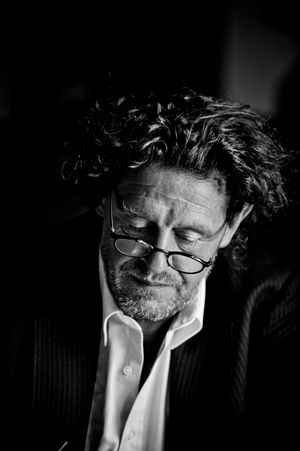
“I spent 22 years in a kitchen, working for six or seven days a week, working extreme hours – my average week was more than 100 hours. People may ask why I worked so hard. The answer is fear of failure, ruled and fuelled by my own insecurities.
“But I’m glad I did it. What’s interesting in that when you spend that length of time in a kitchen, you become institutionalised. You become oblivious to what goes on in the outside world. And you become quite scared of the outside world.
“And so when I left the kitchen, in a strange peculiar way I lived the childhood I never had for five years. I did all the things I dreamed of doing as a child.
“Through doing all those things, I started to discover myself. Self-discovery is so important. I do things I enjoy doing, whatever they might be. I’m quite reclusive. I’m only ever seen in public when I’m working.
“If I don’t work, no-one sees me. I suppose what I’m trying to say, probably in a bad way, is that I just crave ‘ordinary’. That’s what I crave. What I’ve learned in my life is that privacy is freedom. I think as you grow older, everything starts to become simpler. When you’re young, you tend to overwork things, overdo things. You tend to be motivated by your ego. If I reflect back on my life, actually, I never wanted three stars. I just wanted to be accepted.”
The reasons for that desire can be traced back to his heritage. Marco was born an outsider and has sought acceptance throughout his life.
“I believe I’ve never been truly accepted. I was born in the very early 60s with an Italian mother, not too long after the Second World War, I wasn’t accepted. Everything I did in my life was about wanting to be accepted.”
Today Marco is relaxed. His day is a round of meetings and planning, of smoking too many cigarettes and strapping on Wellington boots at his farm. He is frequently on the road, working in Singapore and Australia or travelling to the USA and Europe. Few men are in such high demand. His life is being turned into a movie by Ridley Scott, who bought the rights to his autobiography, The Devil in the Kitchen. He is being played by Oscar winner Russell Crowe and Oscar-nominated Michael Fassbender.
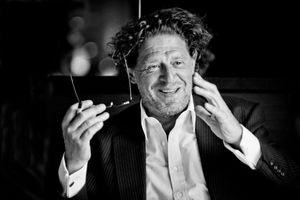
He has a fierce intellect; an analytical mind able to hone in on the root of an issue with laser-like accuracy. He is probably happier now than he’s ever been. At peace with himself and confident in his outlook, he has a better sense of self than he’s ever had. Not that he’d try to change the young tyro who redrew Britain’s culinary landscape.
“I wouldn’t give any advice to my younger self for the simple reason that I believe a young man has to make his own mistakes. I think the clever man takes knowledge from those mistakes. If you don’t make mistakes, you’ll never learn. You’ll live a one-dimensional life. I’ve never been happier in my life than I am today. I live a simple life. I’m not seen in public.
“There are three things I don’t do in my life: funerals, weddings and the public – unless I’m working, I just hide myself. I suppose I don’t have a job, it’s just a way of life. I enjoy what I do.”
He is fascinated by the changes that have taken place in high end restaurants since he rewrote the rule book.
“It’s sort of become conveyor belt cuisine. Chefs have turned canapés into a dinner party. So you get canapé-sized portions times by 12 or 18. It’s never fulfilling. You end up having dinner with the waiter because every time he brings something he tells you what it is and tells you how to eat it and then asks you two minutes later whether you enjoyed it? The food tends to be tepid because it’s small portions. Service is being dissolved.”
He takes inspiration from all parts of the world; from Singapore and Barbados, from Norway and the Med. But irrespective of where he is, he notes similar trends – regardless of culture, creed or demograph. Most people are aspirational.
We talk for longer than we’d planned and then, when the tape stops running, he offers a drink and we talk for even longer about the things that matter most: family and wellbeing, children and loved ones. There is no artifice or pretence. His body language is relaxed and composed. He is engaged and attentive. The gasket-blowing, one-dimensional caricature portrayed on TV or in newspaper articles is notable only by his absence. The man before us is a humble genius.

